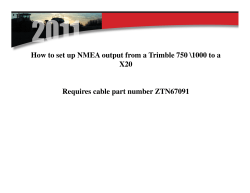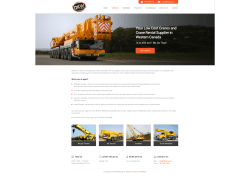
For Immediate Release 6 New Hybrid Rubber-Tired
For Immediate Release 6 New Hybrid Rubber-Tired Gantry Cranes (RTGs) powered by Corvus Energy to be installed in Waigaoqiao Terminal, Shanghai April 29, 2015 – Richmond, BC – Corvus Energy announced today they will provide the battery systems for an additional six new integrated hybrid solutions for new rubber-‐tired gantry cranes (RTGs) that will be produced by integrator CCCC Shanghai Equipment Engineering (CCCCSEE) for Shanghai Zhenhua Heavy Industry Co. Ltd. (ZPMC), the world’s largest port crane manufacturers, and installed in Waigaoqiao Terminal, Shanghai. CCCCSEE is leading the shift towards green technology in China’s largest port by integrating diesel-‐battery hybrid RTG technology. This latest order of 6 Corvus ESSs for hybrid RTGs follows 2 previous orders for the same systems installed in Shanghai last year. Cranes equipped in this manner are proven in the field to operate at optimal efficiency with decreased fuel consumption, reduced emissions and lower operating costs due to reduced maintenance. Unlike conventional diesel electric port cranes, the hybrid version from CCCCSEE is powered primarily from the Corvus Energy Storage System (ESS) resulting in fuel savings of up to 65% with the added benefits of lower operating costs, lower greenhouse gas emissions and reduced noise levels at the terminal. “We are proud to continue to partner with CCCCSEE and ZPMG to provide Corvus Energy products and expertise to make these 6 new RTGs possible. Operators are reducing costs and improving performance by adopting the CCCCSEE and Corvus integrated hybrid solutions and concurrently reducing emissions”, said Andrew Morden, President and CEO of Corvus Energy. “Both goals are important for Corvus, CCCCSEE, ZPMC and the port operators and we are very pleased to be part of this important initiative.” “CCCCSEE continues its corporate vision of industry leading engineering excellence with the advanced integration of energy storage technology to our port operations infrastructure. Corvus battery systems deployed last year have met and exceeded expectations in performance and cost savings and we are confidently moving ahead with an additional 6 cranes,” said Gao Jianzhong, Chief Engineer, CCCCSEE. “Once again, we have leveraged our significant intellectual property and strategic relationship with our sister company, ZPMC to dominate the modernization and new-‐build of port machinery worldwide. Corvus technology is a cornerstone of this strategy and the proven performance, durability and reliability of its battery systems is ideally suited for the demands of our industrial applications.” Media Contact: Sean Puchalski VP Strategic Marketing and Accounts (604) 227-0280 ext. 123 spuchalski@corvus-energy.com About Corvus Energy Corvus Energy provides high power energy storage in the form of modular lithium Ion battery systems. Its purpose built, field proven battery systems provide sustained power to hybrid and fully electric heavy industrial equipment, including large marine propulsion systems. For more information visit www.corvus-energy.com About ZPMC Shanghai Zhenhua Heavy Industry Co. Ltd. (ZPMC) is a heavy-‐duty equipment manufacturer that specializes in port machinery, steel structures, and off shore products. ZPMC is a state holding company listed on A and B shares on the Shanghai Stock Exchange. The major shareholder is China Communication Construction Co. Ltd. (CCCC), which is one of the top 500 companies in the world. About CCCC China Communication Construction Co. Ltd. (CCCC) and its subsidiaries are principally engaged in the design and construction of transportation infrastructure, dredging and heavy machinery manufacturing business. It is the largest port construction and design company in China, a leading company in road and bridge construction and design, a leading railway construction company, the largest dredging company in China and the second largest dredging company in the world. The Company is also the world’s largest container crane manufacturer. The Company currently has 34 wholly-‐owned or controlled subsidiaries.
© Copyright 2025










